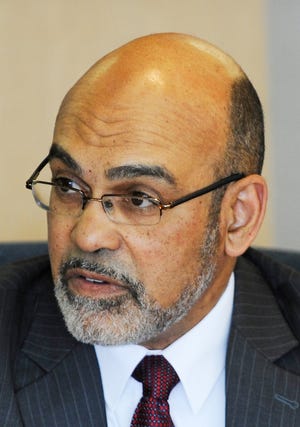Ethics board looks to broaden Sabree land deal review

Members of the Wayne County Ethics Board indicated Wednesday they were ready to broaden their review of Treasurer Eric Sabree's family purchase of tax foreclosure properties.
Several board members said they were interested in getting more information before a May 15 hearing, including whether other treasurer employees or their families bought at the annual auction and looking into allegations of inconsistent foreclosure policies.
“I have heard and read about special treatment being given to some people in respect to taxes and it seems like it’s not extended to others ... the arbitrary nature of deciding whose property to foreclose upon and whose not when taxes are outstanding.” said board chairman Carron Pinkins.
The review kicked off in February, when Wayne County Executive Warren Evans asked the ethics board to review the real estate transactions detailed in a Detroit News investigation, which he called "extremely troubling."
Board members requested several documents, including any conflict-of-interest disclosure forms Sabree may have submitted to the county.
During a public comment period, several people expressed complaints about the foreclosure process, including asking the ethics board to find out if other office employees or family members had bought properties at the auction.
Board member Freman Hendrix said he wants the treasurer's office to provide that information.
And board member Sue Carnell said she'd like to look at the foreclosure process.
“This is a broader issue," Carnell said. "The issue is whether or not the treasurer’s office or the treasurer himself violated the procedures and processes and in that violation was it unethical. So that opens up the door to look at the entire procedure and processes for foreclosure for taxes, for land bank or whatever else has come up.”
The ethics review comes as the FBI is scrutinizing Sabree family property dealings, The Detroit News reported.
Among The News' findings: A company Sabree formed in 2002, which he says is now run by his wife, bought properties in 2011 in the county's tax foreclosure auction in violation of county rules. His son Adam Sabree also was listed as a successful auction bidder on a Detroit house in 2017, according to records.
County rules ban family members of Treasurer’s Office employees from participating in the auction, which seizes properties from delinquent taxpayers after three years of nonpayment and resells them to the highest bidder.
Eric Sabree has said he thought his wife's involvement wasn't a problem because the auction was run by a third-party auction company that year. Sabree started on staff in March 2011 and his duties included coordinating the auction, according to his resume.
"(Sabree) was only on staff for a few months at the time of the auction and he apparently misinterpreted the internal rule that existed," Sabree attorney Philip Thomas wrote to the ethics board. "He truly regrets the fact that he interpreted an independent auction house's involvement as the meaning that the proscription against his wife company bidding at the auction did not apply."
"However, Mr. Sabree adamantly denies that his wife's 2011 purchases gave rise to a conflict of interest."
Adam Sabree, an attorney, denies that he bid on the house, saying he was only helping a client and it was a mistake. And the home's buyer also told The News Adam Sabree wasn't the bidder.
The ethics board on Wednesday also discussed Evans' decision not to respond to Sabree's response to the complaint. The question was whether the board could pursue the review if Evans didn't attend the next hearing and present evidence to support his complaint.
The board's attorney, Avery Williams, told members he believes they could call witnesses and review information even if Evans doesn't present evidence.
Board member Robert Young told members Wednesday that he wanted the group to focus on its limited role as an ethics board, saying it can't weigh in on policy.
"I just don’t want to go too far down that road as if somehow our judgment can be substituted for that of the treasurer," Young said.
The News' investigation found at least 10 properties owned by Sabree, his wife or U.S. Development Services that owed nearly $29,000 in delinquent taxes as of November, debts that were paid off 10 days after The News made inquiries about them. One of those properties by law should have been resold at auction because of the debt, but was not because of an error, Sabree said.
U.S. Development, which Sabree formed in 2002, bought three Harper Woods homes from the auction in 2011. That company later violated a requirement that tax payments for the homes remain current for at least two years.
The FBI contacted a former Sabree staff member who complained to human resources about suspicious activity on the accounts of Sabree family properties, according to two sources familiar with the federal review who spoke with The News.
Sabree's lawyer said it was discovered in 2017 that the treasurer's family underpaid taxes on their delinquent property bills by $13,000, around the time of events the former staffer describes in her complaint.
Thomas attributed the shortfall to a mistake by Sabree's staff involving about a dozen family properties. The treasurer's wife paid the bills on May 24, 2017, shortly after they were recalculated, he said.
But neither Sabree or his attorney have responded to questions from The News about how the mistake happened or who discovered it.